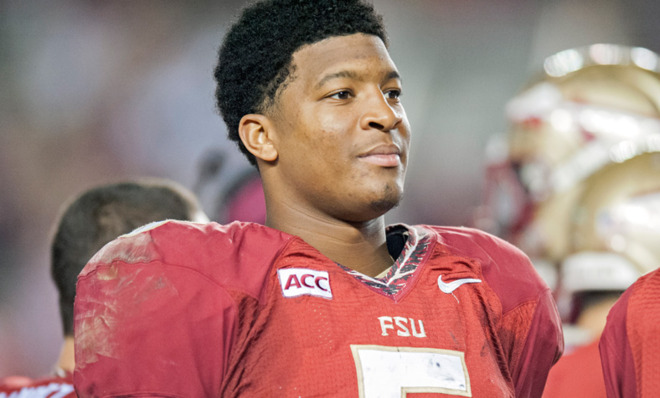Jameis Winston may be a free man, but college football is still on trial
It is impossible to look at this case in isolation

A free daily email with the biggest news stories of the day – and the best features from TheWeek.com
You are now subscribed
Your newsletter sign-up was successful
Today, Florida State Attorney Willie Meggs announced that he will not file charges against Jameis Winston, the Florida State University star quarterback accused of rape, due to lack of evidence. While Winston may be free to play in the ACC Championship game on Saturday, the ugly history of football's handling of rape and sexual assault means this case will never be satisfactorily closed.
Winston may well be innocent. Still, the case fits a pattern that has become all too common. It is a microcosm of college football's long history of covering up for players and obfuscating justice, especially when it comes to sexual assault.
Tim Murphy at Mother Jones has done a thorough rundown of sexual-assault charges in NCAA football, and the colleges, as well as local police, end up looking nearly as bad as their players. Unfortunately, this reflects how uniquely college football — some would argue football in general — has mishandled rape cases.
The Week
Escape your echo chamber. Get the facts behind the news, plus analysis from multiple perspectives.

Sign up for The Week's Free Newsletters
From our morning news briefing to a weekly Good News Newsletter, get the best of The Week delivered directly to your inbox.
From our morning news briefing to a weekly Good News Newsletter, get the best of The Week delivered directly to your inbox.
It might have been common in 1974 to say a woman accusing men of rape was a "queen of the slum with a mattress tied to her back," as Notre Dame administrators called a woman who accused six of their players of rape.
But even in the 21st century the degree of victim-shaming and covering-up by administrators and police is especially disturbing, Murphy explains. One example: In 2004, when Arizona State University recruit Darnell Henderson was accused of sexually assaulting women in his dorm, nothing happened. When he was accused of rape later that year, administration officials accompanied him to his meeting with investigators, who ultimately declined to pursue the case.
In the Winston case, Meggs said in a press conference, "There is a burden of proof, and we don't feel like we could meet that burden." That may legitimately be true, but that is arguably a reflection of how police have been biased toward Winston from the start.
Michael Rosenberg at Sports Illustrated points out the sheer length of time between when the accuser came to the police (December 7, 2012, the night of the incident), and the announcement of charges (nearly a year later). The alleged victim claimed in a report that police tried to convince her not to press charges, saying Tallahassee is "a big football town and the victim needs to think long and hard before proceeding against him because she will be raked over the coals and her life will be made miserable."
A free daily email with the biggest news stories of the day – and the best features from TheWeek.com
The absence of charges, let alone the tremendous time delay, stands out all the more considering Winston's teammate Greg Dent, who is not as much of a star as Winston, was charged this summer by Tallahassee police just a day after accusations were made. The evidence of the police's preferential treatment raises "serious questions that are a lot bigger than a Heisman trophy," writes Rosenberg.
It would be easy, but simplistic, to say that this is Steubenville redux, i.e. because Americans love football so much, we hide the alleged crimes of our local heroes. But college football's problems are more complex, especially when you consider the financial aspect.
When FSU is doing well and playing a major rival, the city makes over $10 million in a weekend. In 2011, the football team generated over 40 percent of the entire athletic program's total revenue.
And a team's financial impact on its colleges is even deeper, as football success can improve a school's student body and increase profits from tuition. Jessica Luther at RHRealityCheck explains: "When large athletic programs do well, applications increase and more students from out-of-state attend and pay tuition."
These are the incentives at stake when football coaches, college administrators, or local police cover up their players' bad behaviors, pressure victims, and stand in the way of a fair trial. These might be the reasons, but there is no justification.
Jameis Winston has walked away a free man. But college football itself should be on trial.
Emily Shire is chief researcher for The Week magazine. She has written about pop culture, religion, and women and gender issues at publications including Slate, The Forward, and Jewcy.
-
 Why are election experts taking Trump’s midterm threats seriously?
Why are election experts taking Trump’s midterm threats seriously?IN THE SPOTLIGHT As the president muses about polling place deployments and a centralized electoral system aimed at one-party control, lawmakers are taking this administration at its word
-
 ‘Restaurateurs have become millionaires’
‘Restaurateurs have become millionaires’Instant Opinion Opinion, comment and editorials of the day
-
 Earth is rapidly approaching a ‘hothouse’ trajectory of warming
Earth is rapidly approaching a ‘hothouse’ trajectory of warmingThe explainer It may become impossible to fix